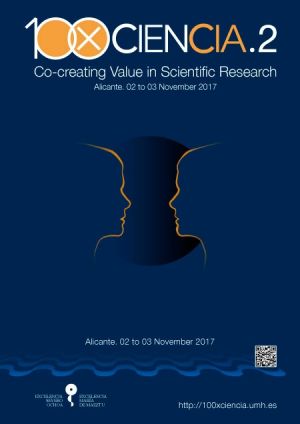Durante los días 2 y 3 de noviembre tendrá lugar en Alicante la segunda edición del Congreso 100xCiencia.2, en la que participarán 40 centros y unidades de investigación españoles reconocidos por el programa de excelencia “Severo Ochoa” y “María de Maeztu”, respectivamente.
Las acreditaciones “Severo Ochoa” y “María de Maeztu” son el mayor reconocimiento institucional a la investigación científica en España, y los centros son seleccionados por un comité de evaluación internacional. Estos centros cubren prácticamente todas las áreas del conocimiento, desde física y matemáticas hasta medio ambiente y biomedicina, pasando por las humanidades.
Este año el encuentro que tendrá lugar en Alicante lleva por título “Co-creating Value in Scientific Research” y está dedicado a la transferencia de los conocimientos que se generan en los centros y unidades de investigación y su puesta en valor de cara a la sociedad.
“El término transferencia abarca una gama muy amplia de actividades de colaboración con beneficio mutuo entre el sector público dedicado a la investigación y las empresas. Aunque no es el único, constituye un deseado retorno de la inversión pública en investigación, porque proporciona una fuerza motriz significativa para la mejora del crecimiento económico y el bienestar social. Por otra parte, el concepto de transferencia no deja de evolucionar y en la reunión de Centros y Unidades de Excelencia en Alicante se analizarán y discutirán las formas más actuales de la misma", explica Juan Lerma, exdirector del Instituto de Neurociencias de Alicante y presidente del Comité Científico de 100xCiencia.2
"La transferencia de los conocimientos básicos que se generan y las tecnologías que se desarrollan en los centros de investigación son uno de los pilares básicos sobre los que se asienta la actividad de los mismos. No menos importante que la propia investigación, lo son la formación o la difusión”, añade Juan Lerma.
El encuentro constará de tres conferencias magistrales impartidas por tres científicas de reconocida relevancia internacional: Krista Keränen, Lita Nelsen y Nuria Oliver.
Krista Keränen es doctora en ingeniería. Actualmente trabaja en la Universidad Laurea de Ciencias Aplicadas de Finlandia como directora de emprendimiento e innovación. Ha sido galardonada en el Concurso Europeo de Mujeres Inventoras e Innovación en 2013.
Lita Nelsen ha sido directora de la Oficina de Licencias de Tecnología en el Instituto Tecnológico de Massachusetts durante 24 años, hasta 2016. Máster en Ingeniería Química del MIT, antes de unirse a esta institución, pasó veinte años en la industria. Entre otros cargos, es asesora de propiedad intelectual de la Iniciativa Internacional de Vacunas contra el SIDA y miembro fundador del Consejo de Administración de Propiedad Intelectual en Investigación en Salud.
Nuria Oliver es una de las mujeres investigadoras más citadas en España en informática. Es ingeniera de Telecomunicaciones, doctora por el Media Lab del Instituto Tecnológico de Massachusetts (MIT) y directora de Investigación en Ciencias de Datos en Vodafone1 y Chief Data Scientist en DataPop Alliance.
Junto con las conferencias magistrales, en el encuentro habrá también mesas redondas compartidas por investigadores de los Centros Severo Ochoa y las Unidades María de Maeztu con representantes del mundo de la industria, las oficinas de transferencia de tecnología, la política y la administración económicas. Se incluyen también en el programa ponencias cortas de los centros y unidades de excelencia más exitosos en transferencia e innovación y de expertos en esta materia.
Este encuentro de Alicante está planteado como un espacio para el diálogo e intercambio de experiencias con el objetivo de fortalecer la capacidad de transferencia de conocimiento y potenciar el impacto social de la labor investigadora desarrollada por los centros y unidades de excelencia de nuestro país.






